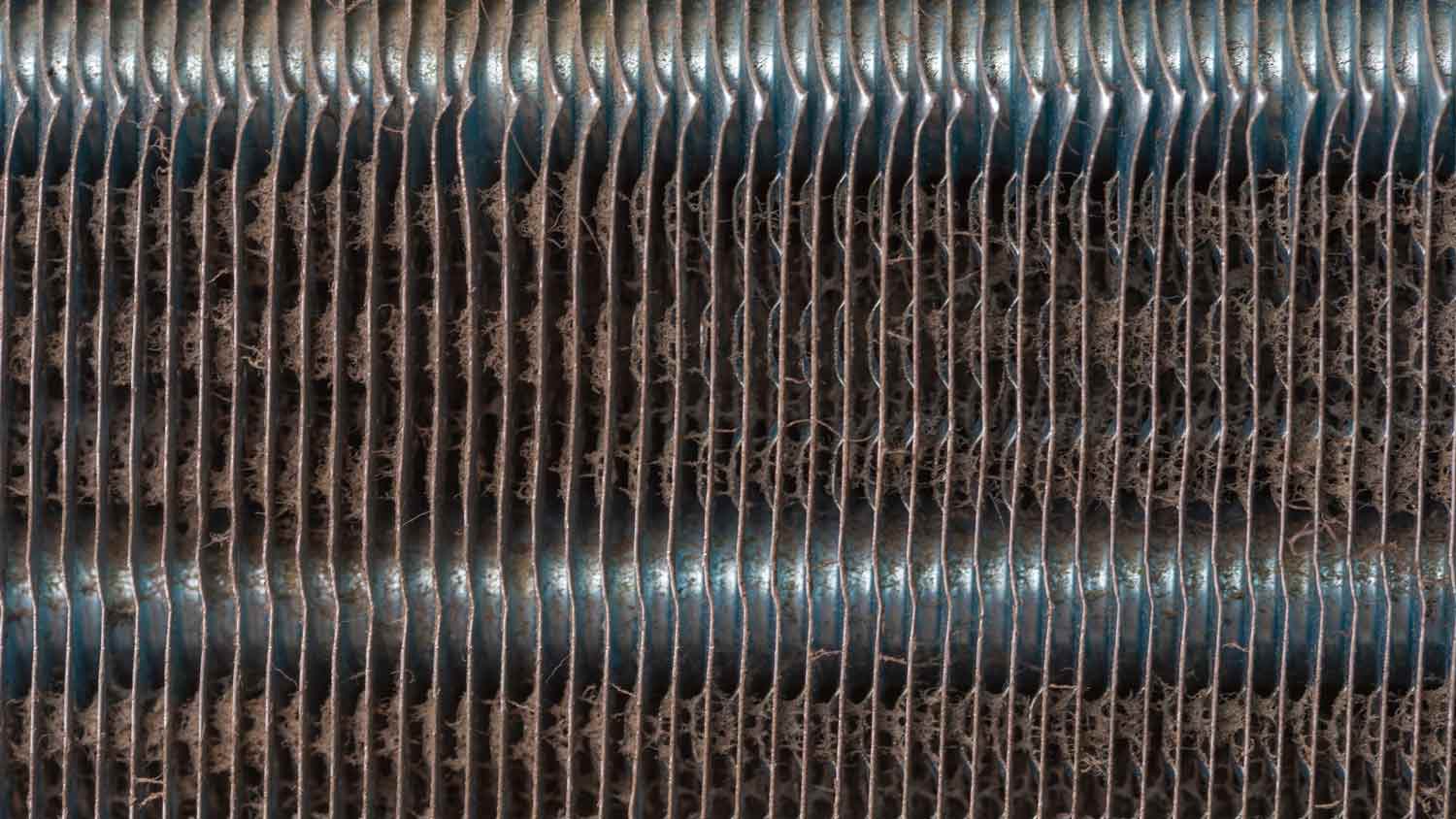What Happens When an Evaporator Coil Gets Dirty?
Dirty evaporator coils cause many problems to your AC unit and inside your home


A dirty evaporator coil can cause higher energy bills, system inefficiency, and poor indoor air quality.
You should clean your evaporator coils at least once per year.
If your evaporator coils develop a heavy buildup of grime and debris, they won’t function properly.
If you’re wondering what happens when an evaporator coil gets dirty—well, there are several possibilities, including damage to the equipment, poor performance, and higher electricity bills. You might have dirty evaporator coils if you don’t regularly maintain your AC unit. One of the key elements of a well-performing air conditioning system is a clean evaporator coil, which you can achieve with the help of an AC repair pro. Our guide will show you how to determine whether your evaporator coil is dirty.
Common Effects of a Dirty Evaporator Coil
Your HVAC evaporator coil is inside your AC unit next to the air handler or blower. This essential component holds the refrigerant and absorbs heat and humidity from inside your home. The evaporator coil is the first part of the cooling process—the condenser coil then releases the warm air outside, allowing cool air to circulate through your home. The evaporator coil is an essential part of the cooling process. So, if it gets dirty, you’ll notice several symptoms, including the following.
Higher Energy Bills
Even a single speck of dust on your evaporator coil can decrease its performance. So, if grime, dirt, and debris cover your evaporator coil, your AC system will have to work harder to produce cool air in your home. As a result, you’ll most likely get higher electric bills.
System Keeps Cycling
When an evaporator coil is dirty, your system will have more difficulty reaching a pleasant, cool temperature in your home. The system will overcompensate by repeatedly cycling while trying to reach your home’s desired temperature. This frequent cycling puts more pressure on the evaporator coil as it attempts to operate more efficiently. In that case, you may even need an evaporator coil replacement, costing between $600 and $2,000.
Reduced Cooling Performance
If you notice warm air coming from the vents or if your AC unit isn’t cooling your home as it should, it’s a likely signal that your evaporator coil is dirty. When dirt, debris, and grime accumulate on the evaporator coil, the coil cannot effectively absorb the heat inside your home. If the coils cannot move hot air throughout the system, it will reduce the AC unit’s performance, leaving your home more hot and humid.
Ice on the Evaporator Coil
One of the surest signs of a dirty evaporator coil is ice or frost buildup on the coil. Since dirt and debris restrict airflow and limit the evaporator coil from collecting hot air inside your home, the coils can drop in temperature. And if they drop below freezing, you’ll see an ice buildup on the coil. Ice and frost can cause further damage to the coil and reduce the cooling capacity of your AC system.
Mold and Mildew Buildup
If too much moisture builds up on the evaporator coil, it can cause bacteria to grow. The bacteria can produce mold and mildew, sending musty odors into your home. If you notice foul-smelling air coming through the vents, you should have your evaporator coils checked immediately. Mold and mildew can cause respiratory issues and other health concerns. You may also want to budget for air duct cleaning to remove mold and mildew from your home. You can expect to pay $270 to $500 for air duct cleaning.
Poor Indoor Air Quality
Dirty evaporator coils are bad news for people with allergies and asthma. The messier the evaporator coil gets, the more likely it is to trap pollen, allergens, and dust, which can blow into your home as the AC operates. Your indoor air quality can suffer and cause harmful respiratory issues in your household.
Clogged Condensate Drain
The condensate drain removes the condensation that collects on your evaporator coil. However, the drain can become clogged if the coil is dirty. A clogged condensate drain can lead to ice accumulation on the evaporator coil, an overflowing drain pan, and damage to your home’s drywall or electrical wires. You could also pay $50 to $200 to have your condensate drain unclogged.
HVAC System Breaks Down
Dirty evaporator coils can put a lot of strain on your AC unit, especially on the compressor and other vital components. If these parts become overworked, your HVAC system might shut down completely. Here’s what you can expect to pay for HVAC repairs and a complete replacement:
HVAC replacement: $5,000–$12,500
HVAC repair cost: $450–$2,000
How to Clean Dirty Evaporator Coils

We recommend hiring an AC repair company near you to clean dirty evaporator coils. That way, you won’t need to worry about damaging the coils or nearby components. Here’s how a pro will clean dirty evaporator coils:
Unplug and turn off the air conditioner unit.
Open the access panel to see the evaporator coils inside the unit.
Take a vacuum attachment and gently remove dirt, debris, and grime.
For coils coated with thick grease, clean them with a mild detergent.
Let the cleaning solution sit for at least 15 minutes and wipe off with a microfiber cloth.
Check and clean the drain pan.
Put the access panel back on.
Turn the power back on.
Frequently Asked Questions
If you don’t clean an evaporator coil, you’ll likely experience many unpleasant results, including higher energy bills, mold and mildew buildup, ice or frost buildup, a clogged condensate drain, and more. In addition, you’ll be dealing with an overall uncomfortable home and frequent HVAC breakdowns, plus your HVAC will continue to perform inefficiently.
Your evaporator coils should be cleaned at least once per year. However, the frequency of cleaning depends on your air conditioning system age and performance. If your system is old, keeps breaking down, or continues to underperform, you should have your evaporator coils cleaned twice per season.
Your home’s location also plays a central role. For example, if you live in climates with a lot of moisture, humidity, wind, dirt, or dust, you’ll likely need to have your coils cleaned more than once yearly.
Yes, a dirty evaporator coil can freeze up. Dirty evaporator coils can’t absorb or transfer heat properly. The dirt and grime restrict airflow, which is needed to move heat throughout the system properly. Your air conditioning unit could freeze over, or it can cause your heat pump to freeze.





- Furnace Repair
- Air Conditioning Repair
- HVAC Repairs
- Furnace Installation
- Wood & Pellet Stove Repair
- Dehumidifier & Humidifier Repair
- Heat Pump Companies
- Swamp Cooler Repair
- Wood Stove Services
- HVAC Companies
- Commercial A/C Repair
- Geothermal Installation
- Air Conditioning Installation
- Boiler Repair
- 24 Hour Furnace Repair
- Geothermal Repair
- Heat Pump Repair
- Humidifier Installation
- Thermostat Repair
- Thermostat Installation
- Nest Installation
- Heating & Cooling
- Heating Repair
- Furnace Cleaning
- Furnace Tune-Up
- HVAC Technicians
- Subcontractors
- Furnace Maintenance
- Plumbing & Heating Companies
- Wood Stove Inspection
- Mini Split Installation
- Wall Heater Repair
- Duct Installers
- What Is an Evaporator Coil? Everything To Know About This Vital AC Component
- What to Do if Your Evaporator Coil Freezes: 6 Steps to Try
- Evaporator Coil vs. Condenser Coil: How to Tell the Difference
- Why Is My AC Pan Full of Water? 5 Likely Culprits
- 7 Common Mini Split Low Refrigerant Symptoms and Signs
- Signs of AC Freon Leaks and What You Should Do
- Do Air Conditioners Use Water? They Don’t, So Here’s What That Puddle Is
- Breathe Easy: 10 Tips for Improving Your Indoor Air Quality
- Why Is the Outside AC Unit Not Turning On, But the Inside Is? 9 Common Reasons
- Problems With Your AC Unit? Here’s When To Call HVAC Repair










